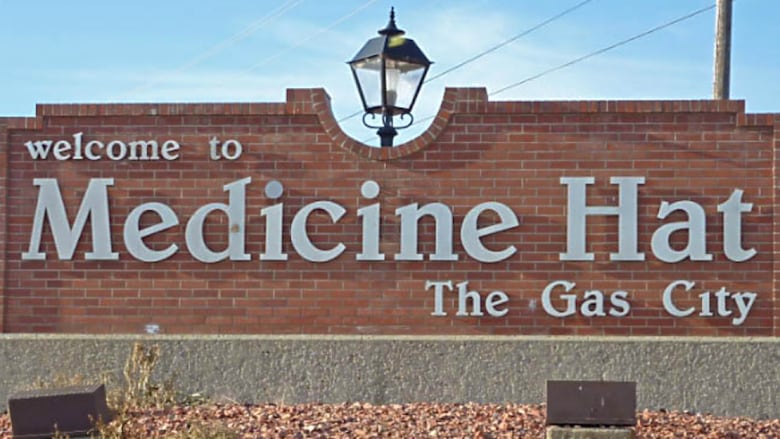Medicine Hat rejects Enmax-style board to run public power plant
City-run electricity company faces challenges in volatile sector

An Alberta city that has promoted its public utilities for more than a century has rejected plans to create a corporate board to run its power plant.
Medicine Hat city council members voted this week to pause exploring the creation of an arm's length, municipally-controlled corporation to oversee its power interests.
That was suggested as a way to improve planning and profitability of the power plant, which staff and consultants say could be challenged in the years ahead by major shifts in the utility sector.
The plant also needs $1.1 billion in upgrades to meet growing demand for electricity and to meet increased environmental standards.
Power profits have put hundreds of millions of dollars into city coffers over the last 10 years, but dividends fell by 90 per cent last year because of low prices.
Despite those challenges, five of nine council members said they share public concerns that a new management board could raise rates and be unresponsive compared to a city department that ultimately answers to elected officials.
Coun. Allison Knodel said there are real concerns about the viability of the business, and action is needed.
But changing to a municipally-controlled corporation, or MCC, was too much all at once for a 120-year-old enterprise that is core to the city's identity, she said.
"I don't want to leave the next generation a sinking ship," said Knodel, who voted to halt MCC discussions but move ahead with a related panel to examine rates and fees.
"It's a lower financial risk as a first step.... Modern problems require modern solutions, but I would prefer to see slow progress instead, starting with a rate committee. So, I'm voting 'not yet' [on an MCC]."
A municipally-controlled corporation — like Enmax in Calgary or Epcor in Edmonton — would be owned by the city but run largely independently of elected officials.
That route was recommended in a consultant's report last year that stated the increasingly complex sector — which faces growing renewable supply, power market changes, and moving climate targets — is beyond the scope of part-time city councillors.
Four council members agreed that a more active, skill-based board of directors with sectoral experience would be better able to make key decisions more quickly.
Coun. Darren Hirsch said the city's power business faces $500 million in capital upgrades on top of plans to eventually spend up to $600 million to add solar generation.
With low prices in the long-term forecast, the margin of error is very thin, he said.
"Status quo is not an option and I wish we could go back 30 years, but we can't," said Hirsch, who chairs council's energy committee.
"It's no longer 100 years of just turning on the taps [to increase revenue]. There are really tough decisions coming to this table."
Record dividend in 2023
Medicine Hat's power company was grandfathered in when the province's power grid was deregulated in the late 1990s. Its municipal franchise area includes the city, the neighbouring town of Redcliff and parts of nearby Cypress County.
It can sell surplus power to the Alberta grid, but since it does not import power, customers are not charged provincial transmission fees.
In 2023, the power plant produced a record $134-million dividend for the city of 65,000 thanks to record prices and export sales, but that also led to public accusations of profiteering.
The backlash led to rebates, reduced local pricing and a wholesale business review.
That review came in late 2024, as dividends fell to $12 million as the market collapsed.
Consulting firm KPMG recommended against privatization, but found the council's role as power marketer, price regulator and plant owner confused the public.
It suggested that an MCC could remove politics, better evaluate projects, contain costs and hopefully lead to higher profits in the future.
"The hope is to drive bigger sums," said Rochelle Pancoast, the city's top energy administrator, this spring.
"We know we're challenged long term with the current state, with or without an MCC, but we're hoping to improve the outlook."

Since 1902, the city's power department has been an arm of city hall, with council ultimately approving business plans and budgets.
Alongside the Hat's once-large natural gas business, profits keep tax rates low, fund debt-free city projects, and feed an $800-million reserve fund.
Officials say those reserves could maintain service levels and avoid tax hikes, but will dwindle without new income.
A 'cop and a baker and a candlestick maker'
Coun. Alison Van Dyke said the utility sector is complex, but anyone running for council should expect to learn and manage the business.
"I did," she told council. "There's always a financial case to be made for corporatization … but economics cannot be the only outcome considered by elected officials."
Coun. Andy McGrogan said part-time council members with outside careers should focus on municipal issues, he said.
"You've got a lawyer and cop and a baker and a candlestick maker making decisions about a complicated utility business," said McGrogan, a retired chief of police.
"You can't guarantee things will get better [financially] under an MCC, but I think the potential is much greater."
Some council members said the decision should be made after the coming October election, but others said bringing newly elected councillors up to speed on the complex issues would create much longer delays.
A hours-long public hearing in June heard concerns that a corporate board would lack accountability and would raise power prices and fees.
Sou Boss leads the Medicine Hat Utility Ratepayers Association, which opposed any change until after the fall election.
"[We need] a really clear path and a clear indication that, yes, an MCC would benefit Hatters," she told CBC News on Monday. "Until they get those questions answered that they haven't, [delaying] is a wise decision."
City staff are now analyzing how a rate review committee would operate outside an MCC model for council's consideration this fall.

